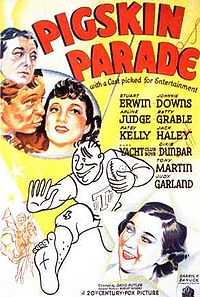|

Pigskin Parade (1936)
One of the Best Lousy Musicals I've Ever Seen
Review by R.S. Lindsay
Pigskin Parade — a 1936 musical that was Judy Garland's
film debut — has only one thing wrong with it. It's kind of lousy.
But as far as movie musicals go, it's a good kind of lousy.
I've seen Hollywood musicals that bored the hell out of me. I've seen
musicals where the songs were lifeless and dull, and the musical numbers
put you to sleep. I've seen musicals where the plot insulted the audience's
intelligence, and where the acting in between the musical numbers was
sheer cinematic torture. I've seen musicals where the performers seemed
to be sleepwalking through the movie, and where the characters they
were playing were so brain-dead and annoying that you just wanted to
whack 'em upside the head with a polo mallet.
Pigskin Parade is silly and corny, but it is never boring. The
musical numbers are not great, but they are always fun to watch. The
characters are stereotypes, but the cast plays their roles with such
enthusiasm that you can't help liking them.
The plot: Bessie and Winston "Slug" Winters (Patsy Kelly
and Jack "Tin Man" Haley) arrive at fictional Texas State
University to coach the football team. Although they spend most of the
movie arguing with each other in Ralph-and-Alice-Kramden mode, they
make an effective husband-and-wife coaching team. Their big success
comes when they discover Amos Dodd (Stuart Erwin in an Oscar-nominated
performance), a country bumpkin farmer who can hurl a melon with missile-like
accuracy. They immediately sign him up as the new quarterback for the
football team.
Texas State is mistakenly invited to play in a charity football game
against Yale. (They wanted the University of Texas, but sent the invitation
for the game to the wrong university.) Will the Texas State team win
the game? Will Amos Dodd score a game-winning touchdown in the final
seconds of play? What do you think?
This is one of those "college musicals" where all the college
students look as if they are about thirty years old. Most of the songs
are sung by a nutty quartet of "sophomores," played by a 1930's
singing group called the Yacht Club Boys (who also wrote the songs for
the movie). The members of the group look as if they are old enough
to be visiting their own kids at the college on Parents Day. One of
them even admits that he has been in college for seven years (beating
John Belushi to that movie line by 42 years.)
The songs sung by the Yacht Club Boys have a great satirical edge to
them. They sing "We'd Rather Be In College," in which they
admit that, with the Great Depression raging, they are better off in
college than they would be in the current job market. Another song,
"Down With Everything," is a wonderful, rousing, and
vigorous musical number that satirizes college revolutionary attitudes,
sung to a would-be college Trotsky. (Lyric: "Down with everything!
That's the major credo of the anti-super-duper-blooper-Commie-buncha-radicals!")
And then there is, "We Brought The Texas Sunshine With Us,"
which the Yacht Club Boys sing in the middle of a snowstorm at the Yale
football game.
The musical numbers are not great, but they are great fun. There is
one number sung by Johnny Downs called "You're Slightly Terrific,"
which pretty much describes the entire soundtrack. The songs are "slightly
terrific," but not overly so.
And then there is fourteen-year-old Judy Garland in her feature film
debut, playing Amos Dodd's country-bumpkin sister. The first time we
see her in the movie, she is barely recognizable, wearing overalls and
sporting pigtails, and using a phony Texas accent. ("Hey, yuh wanna
buy a melon?") Within a few scenes, however, she has been transformed
(off-screen) into a college girl/young starlet. In her first few scenes,
she tells everybody, "I can sing. Wannuh hear me?" It takes
a few scenes before someone lets her sing — and dammit,
can she ever sing!
Her first big-screen musical number is the tail-end of the song, "The
Balboa!" — a rather rocky (har!) college dance number, sung
at the TSU Homecoming Dance. ("The Balboa" was no "Carioca"
or "Continental," although it tried to be.) From there, she
sings "The Texas Tornado" and "It's Love I'm After."
And if you saw this movie in 1936, you just had to know that
Judy was going to be a major star!
To quote the great Roger Ebert, "I cannot recommend the movie,
but... why the hell can't I? Just because it's godawful? What kind of
reason is that for staying away from a movie? Godawful and boring, that
would be a reason."
Well, I could recommend Pigskin Parade. It's not exactly
"godawful," but it is lousy. But despite the lousiness,
you will have a good time watching it. You won't love it the way you
love Wizard of Oz or Singing in the Rain. But you will
like it — as long as you accept the lousiness of the movie and
just go with it.
Rating: *** (3 out of 5 stars, for being lousy but enjoyable)
Available on DVD
|